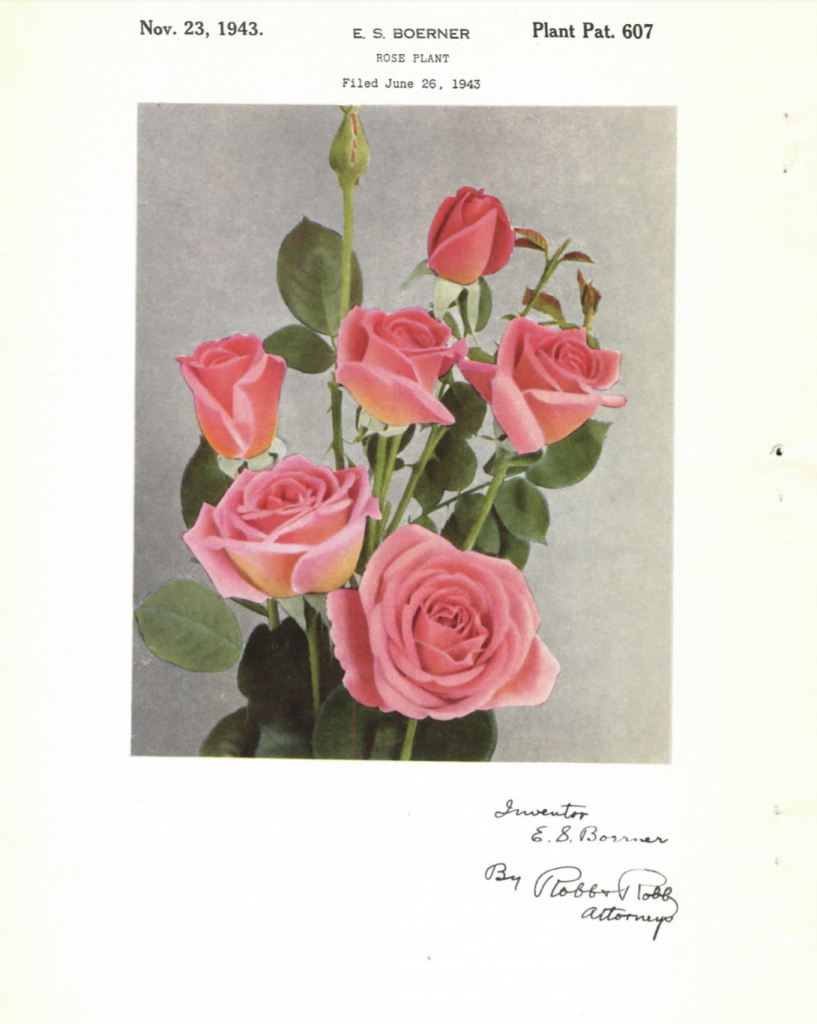The Katherine Tupper Marshall Rose, a hybrid tea rose, is named in honor of Mrs. George C. Marshall who was an avid gardener. How this came to be involved a little bit of ‘digging,’ only to discover that the naming had to do with the war effort during WWII.
Patented by Jackson and Perkins in 1943, (so probably bred in 1933), the Katherine Tupper Marshall Rose was selected the All-American Winning Pink Rose of 1944.
Further information on how and why a rose was named for Katherine is provided in the book, Papa Floribunda, a biography of Eugene S. Boerner, the “Nobel Prize winner of the world of roses,” by Robert Wells. This excerpt is from Chapter 10, A Rose for the General’s Wife, and recalls her visit to Jackson & Perkins in Newark, New York:
 A more important milestone was reached two years later, when a hybrid tea, the Katherine T. Marshall, became the first All-American Rose Selection (AARS) winner. This cross between Chieftain and an unnamed seedling was named for the wife of the wartime chief of staff, General George C. Marshall. The rose had pointed buds of a deep coral pink, suffused with yellow. When the buds opened, they were what Boerner described as a “warm, glowing pink,” with a fruity fragrance. The stems were long, the foliage disease-resistant and, all in all, it was a rose in which its originator had taken the considerable pride even before the results of the AARS voting were in.
A more important milestone was reached two years later, when a hybrid tea, the Katherine T. Marshall, became the first All-American Rose Selection (AARS) winner. This cross between Chieftain and an unnamed seedling was named for the wife of the wartime chief of staff, General George C. Marshall. The rose had pointed buds of a deep coral pink, suffused with yellow. When the buds opened, they were what Boerner described as a “warm, glowing pink,” with a fruity fragrance. The stems were long, the foliage disease-resistant and, all in all, it was a rose in which its originator had taken the considerable pride even before the results of the AARS voting were in.
Mrs. Marshall came to Newark to open a Jackson & Perkins promotional event called the Victory Harvest Garden Show and Gene met her at the depot to drive her to the nursery grounds. After some small talk, he brought up the question: “How would you like to have one of my new roses named after you?”
Mrs. Marshall gave no sign she had heard. She kept gazing thoughtfully out of the car window. Boerner began to feel uneasy. Had he violated the proper protocol in dealing with generals’ wives? Could it be that the wife of the nation’s top military man was offended at the suggestion? Perhaps she felt that her name should not be used in what was, after all, a commercial venture. The silence continued for several minutes. Finally, Gene said he was sorry he had brought the subject up. “I hope I haven’t hurt your feelings, Mrs. Marshall.”
Her reverie ended, she turned to him, smiling, and assured him her feelings were unbruised. It was just that his offer had reminded her of her girlhood, she said. “I grew up on a farm and one day my father told me: ‘Katie, the next time the cow has a calf, I’ll name it after you.’ I was thrilled. I kept waiting and waiting. Finally, sure enough, there was a new calf in the barn.”
“And you dad named it Katherine?”
“He couldn’t. It was a bull. He couldn’t have a bull around the farm named Katie. So I missed my chance then. Now it seems I’m to have another. You can see why I’m delighted to have you name your rose after me.”
Having the blessings of the general’s wife for the rose was a triumph. During the war there was an undercurrent of worry around Newark that gardeners would regard only vegetables as suitably patriotic.
In Jackson & Perkin’s “Rose Letter,” which went to horticulturists and leading rose-growers, they urged Victory Gardeners not to be carried away with their vegetables to the point where they failed to plant flowers and shrubs too!
Mrs. Marshall often worked in the garden with General Marshall at their retirement home, Dodona Manor, in Leesburg, Virginia. In her book, Together: Annals of an Army Wife, Mrs. Marshall referred to their varied horticultural pursuits there. She recalled that she could look out her window “over the rose garden.”

